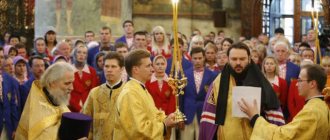Meaning of the word
The liturgical books accepted in the Russian Church were translated from Greek by Sts. Cyril and Methodius. When translating St. Cyril and Methodius were faced with the lack of words and concepts among the Slavs that denote Christian values. There was no exact equivalent for the word "metanoia" (μετάνοια). It was translated as “repentance,” or recognition of past wrongdoing. The Greek meaning of “metanoia” is much deeper: change, insight. Thus, we are talking not just about recognizing one’s sinfulness, but about changing one’s life.
How is repentance different from repentance?
In everyday life, as a rule, compatible but not synonymous terms are identified - repentance and repentance. Judging by what happened to Judas (see Matthew 27:3-5), repentance can be without repentance, that is, useless or even harmful. Despite their consonance in the Russian language, in the text of Holy Scripture these terms correspond to different roots of the words μετάνοια (metanoia) and μεταμέλεια (metamelia). The word μετανοέω (metanoeo) means “to change your way of thinking,” to change your vision, understanding of the meaning of life and its values. And the etymology of the word μεταμέλεια (metamelia) (μέλομαι, chalk - to take care) indicates a change in the theme of care, desire, concern. Repentance, in contrast to repentance, presupposes a deep rethinking of everything radically, a change not only in the object of aspirations and concerns, but also a qualitative change in the mind itself.
Repentance before preaching the Gospel
“Repent, for the kingdom of heaven is at hand.” These were the first words of the sermon of John the Baptist, the Forerunner of Christ. Even then, repentance presupposed the beginning of a new life. Those who came to the Jordan to St. John, admitting his sins and repenting, was simultaneously asked how to change his life: “What should we do?” Such questions were asked by soldiers and publicans (tax collectors). Answers from St. John also concerned the way of life: “Do not demand anything more specific to you ... do not slander, be content with your salary” (Luke 3:10).
Repentance in Orthodoxy
According to the Holy Fathers of the Church, repentance is a “second Baptism” or a “renewal of Baptism.” With the water of Baptism, a Christian is washed from previously committed sins. So with tears of repentance he is washed from his sins. This is overcoming the fall that happened, healing from mental wounds and continuing the path to God. Therefore, it is so important to understand what the meaning of repentance is, what exactly needs to be repented of, and what the Orthodox prayer of repentance is.
Prayer of repentance
Metanoia of the ancient Church
A change in lifestyle and values was repentance in early Christianity. One of the most striking examples is the publican Zacchaeus. His metanoia begins with humility. A famous rich man commits actions that are completely inappropriate for him: he climbs a fig tree to see the Teacher - Christ. And when the Lord comes to the house of Zacchaeus, the transformation of man is completed: he distributes half of his property to the poor, and makes multiple compensation for the damage to everyone he has offended. Therefore, the Lord says: “Now is the salvation of this house” (Luke 19:9)
Useful materials
During the Apostolic ministry, repentance also presupposed the unity of word and deed. “What should we do, men and brethren?” - the believers asked the Apostles after the descent of the Holy Spirit. They received the answer: “Repent, and be baptized every one of you in the Name of Jesus Christ” (Acts 2:37).
The young Christian community itself demonstrated repentance as an act. The converts sold their property, “laying its price at the feet of the Apostles” (Acts 5:1), and began a completely new life, not connected with the previous one.
The same was the image of repentance during the persecution of Christianity. From the life of St. Sebastian knows the episode with the baptism of Eparch Chromatius. The priest asked him:
“Do you renounce your past sins?”
To this Chromatius remarked:
“This should have been asked of me at the beginning: I will put on my clothes again and will not accept holy baptism until I renounce my sins; I will be reconciled with those with whom I had enmity and will love those with whom I was angry; whoever is angry with me, I will ask forgiveness from them. I will forgive all my debtors, but if I have taken anything from anyone by force, I will return it to him strictly... I will arrange all my official and household affairs according to the will of God, and then I will say with boldness: “I renounce all my sins and accept holy baptism.”
Is repentance possible after death?
Repentance as a means of cleansing a person from the filth of sin, a means of restoring personal relationships with God, is possible for a person only within the framework of earthly life. The Earthly Church provides him with all the necessary grace-filled gifts for this.
A person falls into trouble if he does not pay due attention to salvation or even directly opposes God’s Providence for salvation. Actually, that’s why hell becomes his posthumous refuge until the Day of Judgment, as a natural result of his voluntarily chosen life path.
Despite the fact that in hell there is no place for repentance (changing one’s life in accordance with God’s Commandments), there is repentance (regret for the sin committed), and it is very painful. However, the repentance of a sinner in hell, in contrast to the repentance of a righteous person who regrets the sin committed primarily as an obstacle to communication with God, is often determined by the horror of the situation and regret about the loss of earthly goods, and his attitude towards God is often accompanied by bitterness.
This state of mind can be characterized as follows: there is repentance, but there is no love for God, and there is also no desire to live according to the laws of the saints. It turns out that even if he, being in such a state, were transferred to the Kingdom of Saints, would he rejoice there with the same joy that the saints experience? If he doesn’t need God, and the commandments are alien or, worse, hateful, what should he do in Paradise?
The actual disposition of the soul towards hell or Paradise is unmistakably revealed even in a private court. Therefore, the impossibility of repentance beyond the grave cannot be reduced to crude legalism, saying that the sinner would be glad to bring repentance, but God does not allow it: the sinner himself closes the doors to repentance, the doors to the Kingdom of Heaven, while still on earth.
Formation of the rite of repentance
Repentance of Chromatia - conversion of a pagan. But with the beginning of the persecution, Christians appeared who renounced their faith out of fear. Already from the 3rd century. The question arose of how to deal with such believers if they wanted to turn to the Church. There was a special rank for this.
According to sources, already from the 3rd century. repentance was public. It included three stages:
- acceptance of the sinner among the repentant;
- penance;
- return to church fellowship.
At all stages, the priest played the most important role, according to the word of the Gospel:
“...Whatever you bind on earth will be bound in heaven; and whatever you loose on earth will be loosed in heaven” (Matthew 18:18).
At the first stage, the sinner came to the priest, who found out the sincerity of his intentions. The presbyter laid his hands on him in prayer. But this was only the beginning of reconciliation with the Church. On the first day of Great Lent, the penitent, led into the temple by the bishop, was thrown to the ground “in dust and ashes.” The community prayed for him. The bishop delivered a denunciation.
Then the second, longest stage began - penance. Those who carried out this feat were divided into 4 groups:
- those crying (during the service they stood outside the church, asking for prayers for themselves);
- those listening (stood in the vestibule);
- those who fell (were at the service before the Liturgy of the Faithful, they were obliged to leave with the catechumens at its end);
- stand-up (were present at the liturgy until the end, but were not allowed to receive Communion).
For many days, and sometimes months, even years, the sinner moved from one category to another until he turned out to be “worth a purchase.”
The third stage of repentance came after penance. Usually, penitents were introduced into church communion during Holy Week, shortly before Easter. Prayers were said over the penitent, he again asked for forgiveness from the faithful, confessed his renunciation in front of everyone, making a promise to correct his life. Upon the laying on of hands by the bishop, a person was forgiven of his sins. Now he could begin to study the Holy Mysteries.
A reproach to the cities that did not repent, even after witnessing the manifestation of the power of God
Matthew 11:20–24
...He began to reproach the cities in which His powers were most manifested, because they did not repent: woe to you, Chorazin! woe to you, Bethsaida! For if the powers that were demonstrated in you had been demonstrated in Tire and Sidon, they would have repented long ago in sackcloth and ashes, but I say to you, it will be more bearable for Tire and Sidon on the day of judgment than for you. And you, Capernaum, who have ascended to heaven, will be cast down to hell, for if the powers that were manifested in you had been manifested in Sodom, it would have remained to this day; But I tell you that it will be more bearable for the land of Sodom on the day of judgment than for you.
What to pay attention to here
“Willful refusal to repent is the most terrible sin for all who are privileged to hear the Gospel. It is aggravated by the fact that these people and these cities were shown special mercies of God. Seeing the miracles performed by Christ, they had to not only accept the truth of Christ’s teaching, but begin to live in perfect obedience to it” ( Archpriest Alexander Shargunov).
Secret Confession
From the middle of the 4th century, when persecution ceased, there were significantly fewer apostates, and other sins associated with various kinds of passions came to the fore. Confession remains public. But voices are heard about the seduction of such a confession for other faithful.
There is an opinion that the main reason for the appearance of secret confession was the gradual cooling of ardent religious feelings. Not for everyone, confession becomes “metanoia”, when the sin committed is absolutely rejected and can easily be called out loud as non-existent.
Increasingly, believers are ashamed to name their sins in front of everyone.
Interesting fact
It is believed that in the East confession remained public until the 5th century, in the West until the 7th century. Already from the 4th century. Only grave sins (murder, sacrilege, fornication, incest, insult to authority) were subject to public confession.
Gradually the need for painstaking work with the believer and his spiritual problems begins to be realized. Priests-confessors appear with a special blessing from the bishop for this work. Since the 9th century, after the iconoclastic heresy, the practice of making confession only by hieromonks was established in Byzantium. It was believed that monks who showed particular firmness of faith were more reliable spiritual leaders than lay priests.
The thief's repentance on the cross
Luke 23:32–33, 39–43
They also led two villains with Him to death. And when they came to a place called Lobnoye, they crucified Him and the villains there, one on the right and the other on the left. <…> One of the hanged villains slandered Him and said: if You are the Christ, save Yourself and us. The other, on the contrary, calmed him down and said: Or are you not afraid of God, when you yourself are condemned to the same thing? and we are condemned justly, because we accepted what was worthy of our deeds, but He did nothing bad. And he said to Jesus: remember me, Lord, when you come into your kingdom! And Jesus said to him, “Truly I say to you, today you will be with Me in Paradise.”
What to pay attention to here
“You think that in order to destroy the evil caused by 47 years of debauchery, you need to work just as hard in the good order of life... No, that’s not true at all. Everything stained by disgust from him and merciless opposition to him is cleansed, with faith, hope and love for the Lord. There are these dispositions in such strength that in an instant everything is cleaned out. So it was with the thief on the cross. Today you will be with Me in paradise,” the Lord promised him. And nothing unclean will enter heaven” ( St. Theophan the Recluse, 1815–1894).
“Many sin and hope for repentance before death, pointing to the example of the prudent thief. But is anyone capable of a feat like his? <…> “This is his end! What ours will be like, we don’t know, and what kind of death we will die, we don’t know...” (St. Theodore the Studite). Will we then be able to be morally reborn in an instant and spiritually exalted like the “companion of Christ”, “who let out a small voice and found great faith”? Will sudden death not take us away, leaving us deceived in the hope of repentance before death? ( St. John of Shanghai, 1896–1966).
The Sacrament of Confession in Rus'
Rus', which received Baptism from Byzantium, made an attempt to adopt this tradition. However, the number of monastics was too small; there were even few white clergy. Therefore, confession in Rus' was performed by both monks and lay priests. But at the same time in the X-XVII centuries. The tradition was absolute obedience to a confessor, even a lay one, similar to how a monk obeys his elder.
Interesting fact
Until the middle of the 17th century. Confession in Russia had many features that brought it closer to the repentance of the first centuries of Christianity.
For example, according to the Trebnik of 1647, the penitent, like the custom of the 3rd century, was led into the temple by the priest. Next, the priest “will place him in front of the royal doors... in the church the priest will put on sacred clothes and take up the Holy Gospel and the Honorable Cross and place it on the lectern in front of the Holy doors right at the royal doors... Anyone who wants to repent enters with fear and humility and a contrite heart, with his hand bent to Persian... and lays his hand and head on the lectern, weeping with tears his sin.”
The confession itself included questions about all aspects of life. There were lists of questions for lay men, women, boyars, the tsar, monastics, priests, etc. Trebniks until the 17th century. There are no special prayers of permission. After all, the whole sacrament as a whole became “metanoia” for the penitent.
Repentance is an integral part of spiritual life
In the Church, repentance means two things:
- the process of repentance itself: in the form of prayer or simply a state of mind
- and the following internal rebirth of the soul - its cleansing from sin.
In both of its forms, repentance is truly an integral part of the spiritual life of an Orthodox person. In general, there are many integral aspects: participation in divine services, and Church sacraments, and prayer, and keeping the commandments... But priests and saints speak especially about repentance - because this is a human activity that does not have externally described rules and can be “easily forgotten” ", while observing all other rules.
You can read prayers every evening and morning, but not have repentance in your soul.
You can go to confession and not actually have repentance.
You can help all your neighbors, and also not have repentance.
Sometimes monks and saints even specifically asked God for repentance in their prayers - this state is so easy to miss in the bustle of life.
A person’s full spiritual life without repentance is impossible, because repentance cleanses the soul. A pure soul is able to more fully perceive the Grace of the Holy Spirit. Namely, the acquisition of the grace of the Holy Spirit is the main goal of an Orthodox Christian on earth...
“Acquire a peaceful spirit, and thousands around you will be saved,” said one of the most revered Russian saints, St. Seraphim of Sarov.
Venerable Seraphim of Sarov.
Confession and Communion
In the ancient Church the two sacraments were not strictly connected. So, the life of St. Mary of Egypt (IV century) tells that she began to receive Communion after her personal repentance before the icon of the Mother of God. There is no evidence that any confessor performed the sacrament of repentance over Mary.
Interesting fact
It was possible to begin the Holy Mysteries without confession in Rus' until the beginning of the 18th century. The ban on Communion without confession was introduced only during the Synodal period of Church history.
Currently, the issue of the connection between Confession and Communion is being discussed in the church environment, but the tradition of not taking Communion without confession is preserved everywhere.
Curse of the Barren Fig Tree
Matthew 21:18–19
...Returning to the city, [Jesus. — Approx. ed.] became hungry; and seeing a fig tree along the road, he approached it and, finding nothing on it except some leaves, said to it: Let there be no fruit from you henceforth forever. And the fig tree immediately withered.
What to pay attention to here
“The fig tree is cursed for barrenness: a sign of justice, which sooner or later follows long-suffering and puts to death the impenitent. ...This act complemented the lesson contained in the parable [of the barren fig tree, Luke 13 :6-9. — Approx. ed.], showing that the time of God’s long-suffering towards sinners has its term and end” ( St. Innocent of Kherson, 1800–1857).
How is confession done in church now?
The modern rite of confession has developed since the middle of the 17th century. after the liturgical reform of Patriarch Nikon. It is much shorter than the rites to which our ancestors of the 10th-17th centuries were accustomed.
Repentance and Confession
According to the Trebnik, it is necessary to perform the sacrament before the icon of the Lord. The Breviary indicates that the believer when performing the sacrament is one, “and not two or many.” But this rule is almost always violated, since, as a rule, there is more than one person who wants to begin the sacrament.
Now the rank includes:
- the priest's initial cry, “Blessed be our God...”;
- the so-called “ordinary beginning”, according to liturgists, is one of the most ancient elements of any worship service, dating back to the Apostles. This is the Trisagion, the prayers “Holy Trinity”, “Our Father”;
- Psalm 50 (“Have mercy on me, O God, according to Your great mercy”);
- two priestly prayers;
- a brief address by the priest;
- Symbol of faith. It must be said by the penitent, but in practice it is often done by the priest;
- questions to the confessor;
- prayer of permission. While pronouncing it, the priest places the epitrachelion on the penitent.
at the end of the sacrament, “It is worthy to eat” is sung and dismissal is pronounced. But since in most cases confession occurs during worship, most often this is not done.
How to repent: stages of repentance
The advice of Archimandrite Sergius Shevich (1903-1987), who had extensive pastoral experience, can help Orthodox Christians understand when and how to repent. According to Father Sergius, a true Christian brings repentance for his sin three times.
The first repentance is at the moment of awareness of sin. It is very important not to delay this. The effect of sin on the human soul is like a disease. And if you start “treatment” right away, then sin will have a less destructive impact on the human soul.
“Sin is a disease of the soul. The longer you delay the time of contacting a spiritual doctor and starting treatment, the more difficult it will be to cope with your spiritual illnesses later” (His Beatitude Onufry, Metropolitan of Kiev and All Ukraine).
At the end of each day, it is useful to mentally review the events that occurred. When realizing a sin, one should find the reasons for what happened and understand its consequences. This is necessary in order to understand how to properly fight sin in the future. This daily spiritual exercise helps to bring repentance to the Lord again. This is precisely facilitated by the prayers of repentance from the evening prayer rule.
“Like any regular spiritual exercise, nightly repentance requires volitional efforts from a Christian. Nightly repentance helps a person establish an attentive Christian life” (Deacon Pavel Serzhantov).
The third time repentance is brought during the Sacrament of Confession, when a Christian tells the priest receiving the confession about his sin. At this moment, the person again experiences a feeling of shame about what he has done and expresses his desire not to sin again.
“My repentance lies not only in the fact that I said it, but in the fact that I decided not to do it again. When a person repents in this way, he receives very great grace-filled consolation from confession and confesses in a completely different way. Repentance is a change in a person” (Hegumen Nektary Morozov).
How to repent of your sins
Repentance involves changing the way you think and live. According to the Orthodox understanding, verbal confession is only one of the stages of repentance. “Metanoia” itself is a process in which the following is distinguished:
- repentance, that is, awareness of one’s fall. This stage is necessary, but getting stuck on it can lead to despair from the sight of your sins. The most striking example of repentance without repentance is Judas, who betrayed Christ and committed suicide out of despair;
- turning to God, that is, seeking the Lord’s help in overcoming one’s fall;
- actual verbal confession of sins to the priest;
- the resolution of sins coming through the priest from God Himself;
- liberation from sins, strengthening in good deeds, that is, actually a change in life. This stage requires the constant help of God; many experienced confessors say that a person needs not so much to try to cope with sin on his own, but to show the desire, the will to change.
Lectern, Gospel and Cross
How do the concepts of “soul”, “conscience” and “repentance” relate?
“The living soul,” the breath of life, is God’s gift to man, created “from the dust of the ground” (Gen. 1:7). The voice of the soul is the conscience of a person. As the Apostle John the Theologian wrote, “If our heart condemns us, how much more will God? for God is greater than our hearts and knows all things” (John 3:20).
Just as the body requires food and clothing, the soul also needs to satisfy its needs. The main one is the need to communicate with your Creator, God. If a person withdraws from this communication, he feels the conviction of his conscience - the image of God in the soul. Then a person needs repentance. The Holy Fathers advise that when preparing for it, one should be guided precisely by the convictions of conscience, but they warn that a person’s conscience can die, suppressed by many worldly concerns.
Daily confession of sins in home prayer
In the prayer books, among the evening prayers there is “Everyday Confession of Sins.” In addition, experienced confessors advise checking your conscience using prayer 3 of the evening rule and prayer 4 before Communion.
Can repentance fix the past?
Repentance, of course, does not change the events of a person’s past life - “you can’t undo what’s done.” But it changes the attitude towards these events and, with the help of God, gives strength to overcome the consequences of the sins committed.
What repentance is and what it is not
Having come to his senses, he said: “How many of my father’s hired servants have an abundance of bread, and I am dying of hunger: I will get up and go to my father and say to him: Father! I have sinned against heaven and before you and am no longer worthy to be called your son: accept me as one of your hired servants. He got up and went to his father.
(Luke 15:17-20)
| Archimandrite Nektarios (Antonopoulos) |
The Fathers of the Church call repentance the “second Baptism,” the “renewal of Baptism.”
Through the Sacrament of Baptism we enter the Church, we enter the path leading to the Kingdom of God. Thanks to the second Baptism - repentance - a person can be washed from sin with tears of repentance, rise from his fall, be healed of wounds and continue his path to God. Unfortunately, few people know what repentance is, what its deepest meaning is, and what they need to repent of. Repentance is not some kind of legal procedure that frees a person from the feeling of guilt. This is not a formal confession, which a person often allows himself before great holidays. The path traversed by the prodigal son testifies to something completely different.
The very word “repentance”[1] means a radical change in a human being, its rebirth, a change in way of thinking, a change in life, a denial of sin with all the heart. In other words, we must realize with all our being that the path of sin that we have walked leads to destruction. We need to understand that we are in some kind of swamp, far from our home. We need to stop and say to ourselves, “Where are we going? This is crazy! Our Father has a luxurious palace, where everything pleases the eye, but we sit in a quagmire! We must find the determination to return to our father's home, to the arms of God the Father and our fellow men.
In order for repentance to be true, it must be accomplished in practice. Hieromartyr Cosmas of Aetolia[2] says: “Even if all your confessors, patriarchs, bishops and the whole world have forgiven you, you will still not be forgiven unless you actually repent.” That is, if we do not move away from sin and change our lives, our repentance will not be true. It is not even repentance in the full sense of the word.
Many people readily approach a confessor, dejected by the severity of psychological and other problems. They confess with tears and make promises that they will never return to sin, that they will change their lives, etc. But how deep is this kind of repentance? It should not be limited to an outburst of emotions. It takes time, work, skill in virtue and the fight against sin with the assistance of the grace of God. In this case, repentance is carried out latently, in a secret way, in the soul of a person. Just as if a person throws a seed into the ground, and sleeps and gets up night and day; and how the seed sprouts and grows, he does not know, for the earth produces by itself...
(Mark 4:26-28).
As we have already said, repentance is impossible without the grace of God. A person, being in the darkness of sin, not understanding how wonderful life is in God, cannot feel the difference between the sinful life of the world and the holy life of the Church. Only when the grace of God plants the seed of Divine love in his heart will he be able to see his spiritual failure. Sunlight entering a dark room illuminates everything. So the grace of God reveals to us the emptiness of our souls, exposes our passions, our sins. That is why the saints so earnestly asked God: “Grant me complete repentance.” True repentance is a safe path leading to the Kingdom of God.
What is confession
If repentance, that is, a feeling of repentance and rejection of sin, is, as it were, an entry into the Sacrament, then confession, namely confession of sins to the confessor, is the Sacrament itself. There are some misconceptions about both repentance and confession.
For example, many believe that confession is a kind of conversation in which our sins are discussed. What, however, does this have to do with the Sacrament of Penance? If we try to analyze what motivates many of us to confession, it turns out that some of us strive to get some kind of relief from feelings of guilt; others are driven to the priest by fear of “punishment” from God; still others come not with the goal of actually repenting, but only in order to receive communion later. However, all this has too little relation, or no relation at all, to confession and repentance.
Confession, in other words, is the cleansing of the soul from poison. If poison enters the body, then there is no other way to survive than to cleanse the stomach. Confession is the same: we must expel the poison of sin from ourselves, otherwise we are doomed.
Another image can be given. Just as a sick person shows his ulcers to the doctor, describes his pain, anxiety, without hiding anything, we do the same in confession. We bare our souls, reveal our abrasions, bruises, and acknowledge the diagnosis given to us. If none of this happens, then we will walk away with no chance of ever being healed. Ulcers will increase, decomposition and decay will progress, infection will fundamentally undermine our health and lead to death[3].
From all this it follows that it is not God who needs our confession, but we who need it. There is no need to think that by confessing we are, as it were, rendering some kind of service to God. Everything is completely different, but He, as a caring Father, patiently, with inexhaustible love, awaits our conversion.
In this regard, it is worth noting that if in Western Christian faiths during confession, formal and legalistic, the confessor and the penitent are separated from each other by some kind of screen, then in the Orthodox Church confession is carried out in direct communication with the clergy, it is possible under spiritual guidance, with personal contacts between the spiritual father and his children. It must be said that many confess according to circumstances, wherever they find a confessor, and each time with different priests. However, it should be remembered that the same thing happens here as with bodily illnesses. If you change the doctor every time, then the treatment cannot be complete. Our confessor is the only one who knows the “history of the disease”, our previous sins, the peculiarities of the course of the disease - he alone can effectively help us.
Other people have adapted to have, as they say, "two doors." They have a permanent confessor, but when something especially serious happens, out of shame they avoid confessing to their priest and go to someone else. Such behavior, of course, is childish and a mockery of the Sacrament. It shows how far we are from true repentance.
So, we must strive to have one confessor, then our path will be safer. Of course, there are situations when you have to change the priest. But this must be decided with great caution, prudence, and most importantly, after a careful study of the internal reasons prompting such a change.
The Gospel of Repentance
“Then the scribes and Pharisees brought to Him a woman taken in adultery, and, placing her in the middle, they said to Him: Teacher! this woman was taken in adultery; and Moses commanded us in the law to stone such people. What do you say? They said this, tempting Him, in order to find something to accuse Him of. But Jesus, bending low, wrote with his finger on the ground, not paying attention to them. When they continued to ask Him, He bowed down and said to them: He who is without sin among you, be the first to throw a stone at her. And again, bending low, he wrote on the ground. They, having heard this and being convicted by their conscience, began to leave one after another, starting from the eldest to the last; and only Jesus remained and the woman standing in the middle. Jesus, standing up and not seeing anyone but the woman, said to her: woman! where are your accusers? no one judged you? She answered: no one, Lord! Jesus said to her, “Neither do I condemn you; Go and sin no more" (Gospel of John 8:2-12)
“As Jesus passed by, he saw a man named Matthew sitting at the toll booth, and he said to him, “Follow Me.” And he stood up and followed Him. And while Jesus was reclining in the house, many tax collectors and sinners came and reclined with Him and His disciples. When the Pharisees saw this, they said to His disciples: Why does your Teacher eat and drink with publicans and sinners? Jesus, having heard this, said to them: It is not the healthy who need a doctor, but the sick, go and learn what it means: I want mercy, and not sacrifice? For I did not come to call the righteous, but sinners to repentance” (Gospel of Matthew 9:9-13).
“...But He told them the following parable: Which of you, having a hundred sheep and losing one of them, will not leave the ninety-nine in the wilderness and go after the lost one until he finds it? And having found it, he will take it on his shoulders with joy and, having come home, will call his friends and neighbors and say to them: rejoice with me: I have found my lost sheep. I tell you that there will be more joy in heaven over one sinner who repents than over ninety-nine righteous people who do not need to repent” (Gospel of Luke 15:3-7).
“First take the plank out of your own eye, and then you will see clearly to take the speck out of your brother’s eye.”
Luke 6:41–42
Why do you look at the speck in your brother's eye, but do not feel the plank in your own eye? Or, as you can say to your brother: brother! Let me take the speck out of your eye, when you yourself cannot see the beam in your eye? Hypocrite! First take the plank out of your own eye, and then you will see clearly to remove the speck from your brother’s eye.
What to pay attention to here
“In order to be an exposer of other people’s vices, you must yourself be blameless... You must first correct yourself and then, guided by your experience, teach your brother how to get rid of his sins” (Interpreter of the Gospel Boris Gladkov, 1847–1921).
Sermon on the Mountain, Henrik Olrik
Holy Fathers on Repentance
“With regard to active life, we cannot do anything worthy without repentance; but the Lord has much mercy on us for our intention. He who forces himself and holds on to repentance until his death, even if he sins in anything, will be saved for forcing himself; for this the Lord promised in the Gospel.” (Venerable Mark the Ascetic)
“...A dead body does not rise by human force, but a dead soul rises through repentance.” (St. John Chrysostom)
“...If, enjoying sin, you become stuck in it, then repentance will turn away from you, because you knew how good it was and preferred sin to it.” (St. Ephraim the Syrian)
“Repentance is the renewal of baptism. Repentance is a covenant with God to correct life... Repentance is the constant rejection of bodily consolation. Repentance is the thought of self-condemnation and care for oneself, free from external cares... The repentant is an unashamed condemned... Repentance is the cleansing of the conscience" (St. John Climacus)
“When a person stops praying, he moves away from God and becomes like an ox: he works, eats, sleeps. And the more he moves away from God, the worse it becomes. The heart becomes cold, and then he can no longer pray at all. In order to come to one’s senses, the heart must soften, turn to repentance, and be touched” (St. Paisius the Holy Mountain)
Every confession is a step
In the prayer of permission, which the priest reads over each person individually, there are the following words: “Reconcile and unite him with the Saints of Your Church... give him an image of repentance...” That is, the time for repentance seems to have already ended, it seems that the person has confessed, but asks the Lord to give him an image of repentance. And why? Because, as the holy fathers say, when a person enters a dark room, at first he sees nothing, and then his eyes rest, he begins to distinguish large objects, then smaller ones, and if the room is illuminated, he will see everything in even more detail – from confession to confession a person gains spiritual insight.
Each confession is a step for the next stage. The Lord then reveals more, more, in parts. First - the most important, noticeable thing, then less, less, less, even to the point of words, sometimes one remembers how a person sinned. This is the work of repentance that a person does, trying to get rid of sins.
Fighting Sin
St. Theophan the Recluse wrote that it is necessary, first of all, to hate sin. But this is not enough. God's help is needed to overcome sin and its consequences. For this you need the sacrament of repentance.
At the same time, it should be understood that the fight against sinful passions takes a whole life. There is a well-known story about Abba Sisoes, to whom his spiritual son complained: “What should I do, Abba? I have fallen! St. Sisoy answered his brother: “If you have fallen, then get up!” “But, father, I rose and fell again!” - “And get up again!” Having asked how long the fall and repentance would continue, the brother received the answer: “Until you are taken from here, good or bad.”
The Parable of the Two Sons
Matthew 21:28–32
One man had two sons; and he, approaching the first, said: son! Go today and work in my vineyard. But he answered: I don’t want to; and then, repenting, he left. And going up to the other, he said the same thing. This one said in response: I’m going, sir, but I didn’t go. Which of the two fulfilled the will of the father? They tell Him: first. Jesus says to them: Truly I say to you, publicans and harlots go ahead of you into the kingdom of God, for John came to you in the way of righteousness, and you did not believe him, but publicans and harlots believed him; But you, having seen this, did not repent afterwards to believe him.
What to pay attention to here
“Let us not make hasty and rash conclusions such as the fact that harlots and money-grubbers are generally better than pious people. The point is that they, feeling that they live badly, are able to repent, and do repent. But the “pious” simply do not look into their souls; they once and for all believed in their own righteousness, as long as they complied with certain requirements” (Marina Zhurinskaya, 1941–2013).
read Marina Zhurinskaya’s full comments on this and the next parable of Christ .
Lessons of repentance from Holy Tradition
Tradition tells of many cases of sincere repentance and complete change of life already in the first century of the existence of Christianity.
Repentance of the Apostles
One of the most striking examples of repentance is St. Peter. The Great Apostle, revered as one of the “pillars of the Church,” experienced his renunciation of the Teacher for many years. The repentant mood penetrated so deeply into Peter’s life that he could not hear the rooster crow without tears of repentance.
The great Paul, “Apostle of the tongues,” called himself “a monster” and “the least of the Apostles.” He always remembered that he was a persecutor of Christians, converted by the Lord Himself.
Repentance of the saints
One of the most amazing is the penitential feat of the harlot Mary. Repentance and trust in the Lord made her a great ascetic, known as Mary of Egypt.
Holy Venerable Mary of Egypt
But the path to changing yourself is not easy. There, the repentant encounters many temptations, and therefore it is so important to attribute your change not to your own efforts, but to the Lord. The life of Jacob the hermit (March 4) provides an example of both the fall and the uprising by the power of God.
St. James, living in the desert for many years, acquired the gift of clairvoyance and healing, and even cast out demons. Having once expelled the unclean from a young girl, the elder dreamed of his own holiness. Immediately the grace of the Lord left him. The monk, a virgin from his mother’s womb, first fell with the girl, then, fearing publicity, killed her. Falling into despair, the monk, who had ruined his feat, would return to the world. But the brothers’ convictions had an effect on the sinner. It was not God’s will for him to perish. Having secluded himself, the monk prayed for forgiveness for many years. And after 10 years the monk received a notice of pardon. He again became a miracle worker, but never again attributed miracles to his exploits.
Parable of the Evil Vinegrowers
Matthew 21:33–43
There was a certain owner of a house who planted a vineyard, surrounded it with a fence, dug a winepress in it, built a tower and, having given it to the vinedressers, went away. When the time for fruit approached, he sent his servants to the vinedressers to take their fruit; The winegrowers seized his servants, beat some, killed others, and stoned others. Again he sent other servants, more than before; and they did the same to them. Finally, he sent his son to them, saying: They will be ashamed of my son. But the vinedressers, seeing their son, said to each other: This is the heir; Let's go, kill him and take possession of his inheritance. And they seized him, took him out of the vineyard and killed him. So, when the owner of the vineyard comes, what will he do with these vinedressers? They say to Him: These evildoers will be put to an evil death, and the vineyard will be given to other vinedressers, who will give him the fruit in their own time. Jesus says to them: Have you never read in the Scriptures: the stone which the builders rejected has become the head of the corner? Is this from the Lord, and is it marvelous in our eyes? Therefore I tell you that the Kingdom of God will be taken away from you and given to a people bearing the fruits of it.
What to pay attention to here
“We were given a vineyard from God - this world, which we were ordered to cultivate, sanctify, which we were supposed to introduce into Divine holiness, fill with the presence of the Holy Spirit... And we took this world into our own and act in this world like those unworthy workers of God . We reject the one who comes to us with news of truth... by coldness, indifference, by turning away from the messenger of God and telling him: “Go away! Die as if you never existed!”
And when the Savior Christ turns to us with saving news, do we repent? We are touched by what we see during Holy Week, by what we read in the Gospel, but do we change so that everything becomes new in us? Are we not letting Him die the way people made Him die about two thousand years ago?” ( Metropolitan Anthony of Sourozh, 1914–2003).











